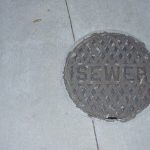There are many things that can clog up the sewer line of your home or business, including fat and grease clogs. To make sure that your sewer line doesn’t get sluggish or start backing up into your home or business, there are steps you can take to protect your drains and sewer lines.
Don’t Allow Food Scraps to Go Down the Drain
One of the challenges for home cooks is that dirty dishes contain food scraps and grease. Even if you have a dishwasher, it’s a good idea to knock food scraps and scrape grease off of your dishes before you load them on the rack. Not only will your dishes clean up more effectively, but you have less chance of clogging up the drain filter under the dishwasher arms.
Even raw veggies can serve as a spot for grease to collect once it gets caught in your drain. Food scraps can become lodged in the p-trap under your kitchen sink. If something sinks to the bottom of the p-trap, cooling grease can collect against it and soon you have a clog. The safest trick for healthy drains is to pour any standing grease off into a separate container and allow it to cool overnight, then discard it.
Hot Water May Not Cleanse the Drain
Many home cooks have learned that they can pour grease down the drain as long as they follow it with hot water. The problem with this scenario is that, eventually, that grease is going to cool off and come in contact with cooler water. This contact may occur far down the sewer line, causing fat and grease clogs farm from your kitchen. It may not cause a clog close to your home, but if your sewer line passes under your back yard on the way to the sewer main, you may develop a clog under your garden shed.
Cooling grease gets sludgy. It sticks to your sewer pipe walls. Even if you flush the grease effectively out of your garbage disposal, it may end up causing a narrowing of the sewer line closer to the main connection. Should another blockage, such as a large wad of toilet paper, end up getting caught up in this narrowed section of pipe, the backup mess you might have to contend with won’t just be grease.
Fat and Grease Clogs Take Time
Sewer lines actually do an excellent job of taking waste and water out of your home or apartment building. Unfortunately, the fat and grease clogs in your sewer line may not be of your making. However, they can leave you with a terrible mess to clean up. If your sewer line is not working efficiently, you may notice:
- Slow drains, such as a kitchen sink that doesn’t empty out efficiently
- Smelly drains, such as an unpleasant odor that hangs around your bathtub drain
- Back-ups, such as a toilet that often needs plunged
Again, the source of your fat and grease clogs may have moved out long ago, especially if you live in an apartment or a condo. If you have a problem with just one drain, the clog may be in just one area of your home. If all of your drains are slow, you may be facing fat and grease clogs that will need to be cleaned out by a professional.
One of the big problems with fat and grease clogs is that they don’t stop at your kitchen. All of the waste and wastewater that goes down your kitchen sink, shower, toilet and bathroom sink ends up in the same sewer pipe at some point. The fat and grease clog that was started by the former owner of your home can become your problem far in the future and can cause a back-up that is dangerous to the health and safety of your household.
Don’t Pour Chemicals Down the Drain!
You may be tempted to dump chemicals from the hardware store down a slow drain. There are many reasons that you shouldn’t do that! First of all, the majority of the drains under your sinks and showers are made of plastic. These chemicals can damage the plastic, meaning that the next bit of grease that goes down your kitchen sink has a new spot to cling, cool and harden. Not only will it clog your sink, but it will smell terrible.
Chemicals poured down a kitchen drain can be incredibly dangerous. If your garbage disposal is harboring a grease clog, you may get splattered with chemicals the next time you turn on the disposal.
Finally, if slow drains are a problem throughout your home, dumping chemicals down the drain can actually increase the chance of more clogs. Hair that goes down the shower drain is almost certain to linger if the drainpipe under the shower is scarred.
Systemic slow drains need care from a skilled sewer professional. They can find the location of the clog and help you prevent the next one from forming.
DIY Clearing of Fat and Grease Clogs
There are DIY steps you can take to clear a fat and grease clog if you know have a ballpark idea of where it is. For example, if every drain in the house is working fine except the kitchen sink, it’s possible that you have a grease clog in the p-trap. If you have a garbage disposal, the simplest way to get a small grease clog to clear is to let it drain as much as it will. Once the disposal is empty and the drain has cleared as much as it can, pour a teapot full of boiling water down the disposal. Do NOT turn on the disposal at this time; you want to wait and allow the hot water to work on the clog. You also don’t want to get splashed with boiling water.
You may hear some glugging and glooping from inside the disposal, which means the hot water has gotten to the grease and is changing the shape of the clog. If the garbage disposal is dry, start running hot tap water into it and turn it on to encourage the grease clog to keep moving.
Your sewer line has a much larger diameter than your drain line. There’s also a lot more water moving through your sewer line, so the constant pressure will encourage occasional fat and grease clogs to move along without much risk of a permanent clog. However, it is very important that you don’t make a habit of dumping grease down your kitchen sink.
You can also try combining vinegar and baking soda to push a clog down a drain pipe. However, this combination will work better in a sink that doesn’t have a disposal. Vinegar can be tough on the rubber seals of your disposal. Additionally, baking soda and vinegar produce a rush of carbon dioxide when combined. The pressure caused by this sudden burst of carbon dioxide can be used to force a fat clog down your drain, but if the carbon dioxide backs up into the garbage disposal, it may not do much to move that fat clog along.
Non-Food Fats to Consider
A pan of leftover bacon grease is an obvious food fat that shouldn’t go down your drain. It’s liquid when hot and solid when cool, so it will inevitably cool somewhere in your sewer line and cause problems for you in the future.
However, there are other fats that aren’t related to foods that can cause serious drain problems. Nonpolar greases such as those found in fuel products like lamp oil or even gasoline should never, ever get flushed or poured down a drain. Mineral oils, such as those found in furniture polish, are also nonpolar greases that can cause serious drainage issue.
There are also many animal-fat based soaps and even hair conditioners that can wreak havoc on your plumbing. Again, these products may not have been used by you or ever poured down a drain by you. However, fat and grease clogs can build up over time and cause dangerous back-ups inside or under your home. These back-ups can flood your basement or even force wastewater into natural watersheds. Careful management of any fat, whether polar like cooking greases or nonpolar like lamp oil, need to be discarded somewhere else beside your plumbing.
Business Responsibilities for Sewer Safety
Commercial food establishments must take care to avoid causing fat and grease clogs. A simple first step is to carefully monitor the temperature of fryer baskets. Using too high a temperature can lead to scorching and require more frequent frying oil changes. Getting the most safe and healthy uses out of your fryer will be good for the drain and the bottom line.
Kitchen managers must keep an eye on the amount of dish soap used. Yes, there are dish soaps that claim to break down grease. However, that broken down grease can still cause sewer line issues once it cools and meets other grease molecules. Staying on top of greasy work surfaces and making sure they’re cleaned with disposable cloths is another simple step and avoiding picking grease up off of a work surface and putting that grease down the drain by using a cloth towel for multiple purposes.
Finally, make sure your grease trap is getting reviewed and cleaned out regularly. Your grease trap may require a regular pumping by a professional on a steady basis to make sure you don’t have a dangerous back-up or overflow, but the contents of your grease trap should never go down any drain on your property..
Bring in a professional to work on the fat and grease clogs in your sewer line if all your drains are slow. Slow drains smell bad. Standing water in all of the drains on your property will give the place a stale odor. The place may also smell like sewer gas. This likely means that your clog is impacting all of the drainage in your home or business; it may even mean that you’re about to face a nasty back-up of more than grease.
Consider getting your sewer line scoped out. Many sewer professionals can go down your sewer line with a camera and provide you with diagnostic information. If your business doesn’t sell food and you frequently have to deal with back-ups, getting your sewer line scoped can tell you what the source of the clog is and what other sewer lines intersect with yours.
You can also find out if other factors are increasing the risk of fat and grease clogs. For example, you may have a tree root that has invaded an old clay pipe sewer line. These roots are feasting on the wastewater in the line. They’re also creating an ideal spot for any floating grease to cling and collect other floating grease until a large, sludgy clog has formed.
Protect Your Drains to Save Hassle and Expense
Start with mesh screen protectors in all of your sinks, both in your home and your business. If it can’t get through the mesh, it shouldn’t go down the drain. Next, pay attention to the fats that you cook with. If you love to cook with butter, do your best to let it come back to room temperature before you clean it off of your cooking pots and plates. Any fat that is solid at room temperature and liquid when it is a real hazard in your drains and sewer lines.
If you have a non-cooking oil product, such as a lamp oil or furniture polish that gets spilled and needs cleaned up, don’t use rags that you’re going to wash and re-use. Use paper towels or cloth that will be discarded. If some of the oil is still liquid, add kitty litter to soak up the liquids to make it more manageable. Do your best to protect your drains from fats that can narrow the interior diameter of the sewer pipe and increase the risk of a dangerous clog.





